As the run of Fannie: The Music and Life of Fannie Lou Hamer came to a rousing close on March 3, 2021, Artistic Director Michael Donald Edwards and Managing Director Linda DiGabriele made themselves available to share what contributed to Asolo Repertory Theatre’s success.
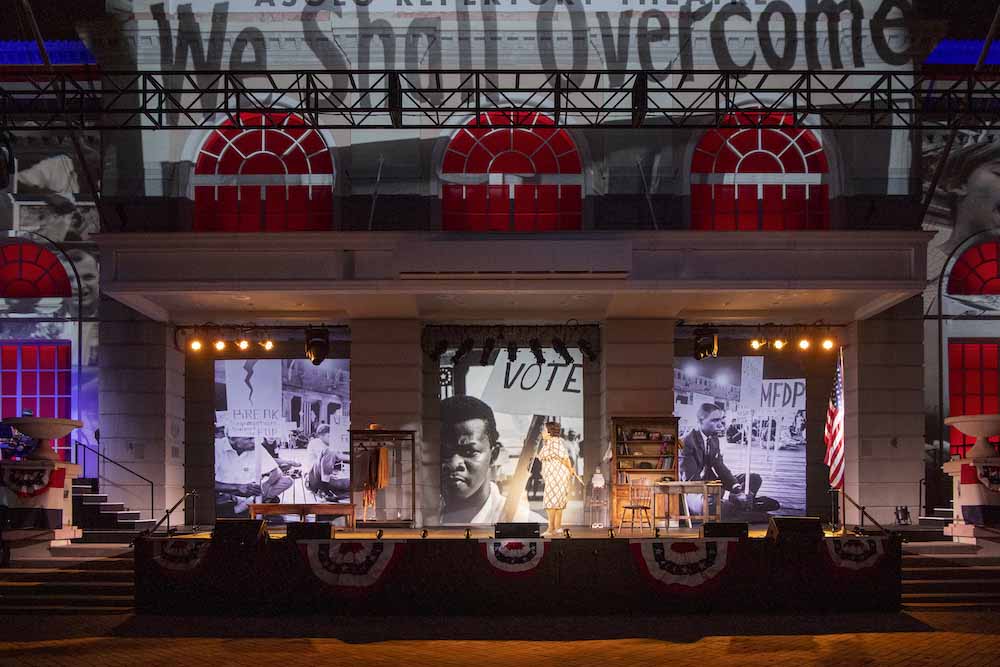
Based in Sarasota, Asolo Rep has been described as “Florida’s premier professional theatre and one of the most important cultural forces in the Southeastern U.S.” by Charity Navigator, which gave it a four-star rating at 95.89 out of 100 for its financial stability, accountability, and transparency.
With over $13 million in revenue and net assets of $32,508,473, Asolo Rep was in sound condition prior to the COVID-19 pandemic’s closure of its 2020 season. Normally it stages up to 15 productions and supports more than 100 artists, technical craftspeople, and administrative staffers.
Last summer I wrote an article challenging DC-area theaters to think outside the brick-and-mortar box. I said there were 10,000 “actors “on the streets in front of the White House. Black Lives Matter Plaza was created on 16th Street. And I said, “This is theater. This is the new American theater. It’s outside. Theaters need to take it to Rock Creek Park, take it to the Merriweather Post Pavilion, somewhere—but don’t shut down completely.”
Asolo Rep had done exactly what I was talking about: They had built a stage outside their main building and created an all-new 2021 season for it. I wanted to know more.
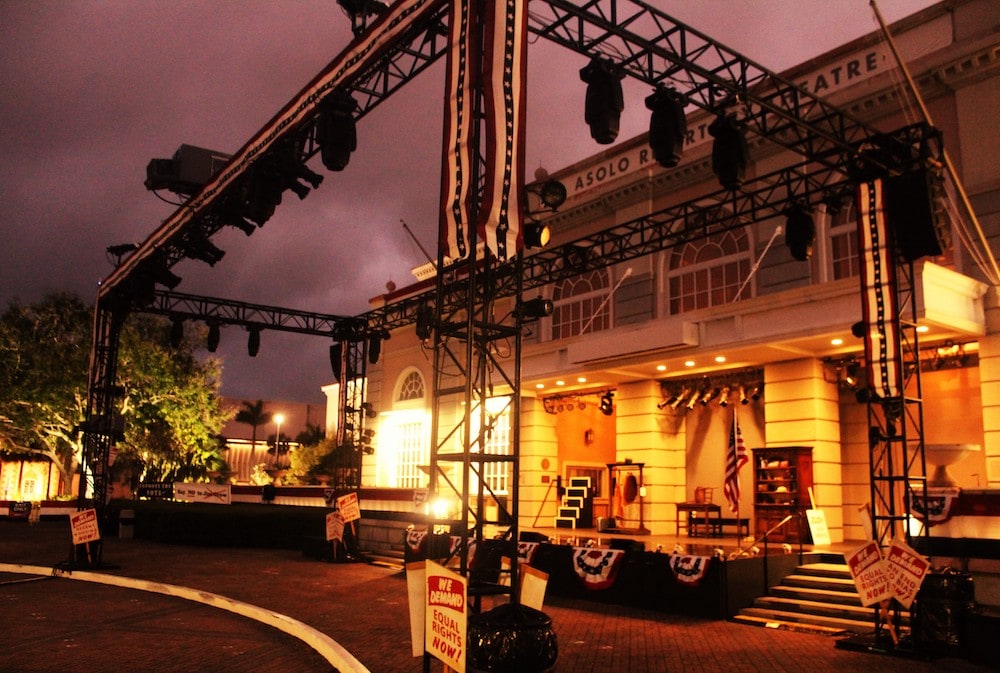
Preparing for the interview, I learned that Asolo Rep’s commitment to diversity and anti-racism was challenged in 2019 by a group of Black students participating in the Florida State University/Asolo Conservatory. So of course I was going to ask about the company’s BIPOC engagement.
Managing to stay alive and meet the moment, Asolo Rep has an enlightening story to tell.
Malcolm Barnes: How does Asolo Rep view itself from a historical perspective as a cultural institution in the life of the arts community in Sarasota?
Michael Donald Edwards: Asolo Rep is now more than 60 years old, and it is a major part of the cultural infrastructure of Sarasota—which has the largest number of professional arts organizations for a city of its size in the United States. Many people move here because of the arts. It’s no accident that E. Faye Butler, leading lady of Chicago and of Washington, DC, would be a leading lady in Sarasota. We have a particular place of leadership as a cultural institution. There’s a level of excellence that’s expected, and every production is an opportunity for much deeper engagement. We don’t have a particularly diverse audience. But we have an audience that’s hungry for the story of diversity.
When was Asolo Rep founded and how long has it been at its current location?
Edwards: From its earliest days Sarasota has been associated with the circus. So there’s a kind of alternative vibe to the community. It’s Florida’s West Village. Asolo Rep is part of John Ringling’s original estate, which is now part of the Ringling Museum. The entire Ringling Campus is under the umbrella of Florida State University.
Linda DiGabriele: The history really starts with a beautiful little historic 18th-century theater from Asolo, Italy, that was brought over and installed at the Ringling. In the 1950s, professors from Florida State University came down and in 1959 began summer performances in that venue, primarily with graduate students doing the work.
In the mid-1960s, that 300-seat house became one of the original LORT members [League of Resident Theatres]. We decided we needed a larger theater that would be commercially viable, so in 1989 we built the theater we have today—still located on the grounds of the Ringling Museum.
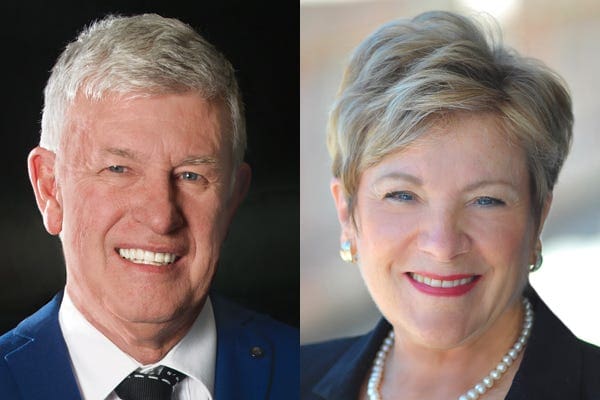
What impact has the COVID-19 pandemic had on Asolo Rep’s financial viability in terms of retaining staff, in the face of declining revenue?
DiGabriele: It’s been incredibly difficult. We had four productions going on March 13, 2020, two in rehearsal and two on stage. We closed that day and had to send a lot of people home. It was heartbreaking.
At that point we had more than 70 people, either full-time seasonal or full-time annual. At the moment we have about 27 full-time. So it’s been painful. But we have used the first round of PPP money [the Small Business Administration’s Paycheck Protection Program] to engage as many of our people as possible. And Michael can talk about the artistic impact.
Edwards: We had to pivot immediately. We had to protect people. And the only way to do that was to stop performing, send as many people as possible home, and try and figure out what the next strategy would be. The board understood what we needed to do. They said, You’ve got to keep this company as whole as you possibly can. And I think everyone believed we’d have a chance at a traditional 2021 season.
Most people who had given money for subscriptions said, “We don’t want the money back; keep it, use it”—with the understanding that we would figure out a way to do a new season. But as the pandemic worsened we were left to ourselves to make very basic decisions about whether and how we did a season, and what the health-and-safety protocols would be.
We reached the point where we said, Okay, we’re going to pivot entirely to online, which we did. And then we began to look at doing work outside. We looked around town and quickly discovered there wasn’t a venue where we could operate at the level we wanted to. That’s when we realized we had the capabilities to build an outdoor stage ourselves. We rented a rock ‘n’ roll rig with projectors and moving lights and built a theater on our front steps.
Then we had to identify shows and assemble artists and because of the tumultuous conversation around racial injustice, I found myself reaching back to the people of color that have worked here. E. Faye is a really good example. I had planned to do a show with her in 2021 and I had to call her and say, E. Faye, we can’t do the show. And she said, Oh, I know; but I have something for you and it will really work outside. She sends me the play [Cheryl L. West’s Fannie]. I immediately felt we’ve got to do it because it’s just so timely, boldly patriotic while still critical of ways America has fallen short. E. Faye already has a following here in town. She’s someone I admire and love as an artist.
Barnes: She knocked it out of the park.
Edwards: Through her, I met all these amazing Chicago artists that were so happy to come here. And they delivered.
We created our health-and-safety protocol through doing an outdoor Christmas show. We had to do it with five people under COVID conditions, very strict. Equity was not ready to sign off, but they said we could do it as a concert. They saw it and said, We’ll sign off on the next two—because we had created a template that they believed in and trusted.
The Christmas show was all local, fabulous people and it got the audience out. We decided we can go ahead with an all-outdoor season. Linda, being an expert on weather, said, We’ve got till the end of April. We’ve ended up with a season that is a diverse event. Not a single show we’re doing had anything to do with the 2021 season we had planned.
Then we had to inform the board: We’re going to do a season outdoors where we think the risk is pretty low, but for the first time we are asking you to sign off on a budget where we may not end up in the black. Unanimously, the board signed off on that. They said it’s more important that we do something, that we keep the brand alive, that we’re out there. Don’t worry too much about the deficit. When has an artistic leader ever been told that?
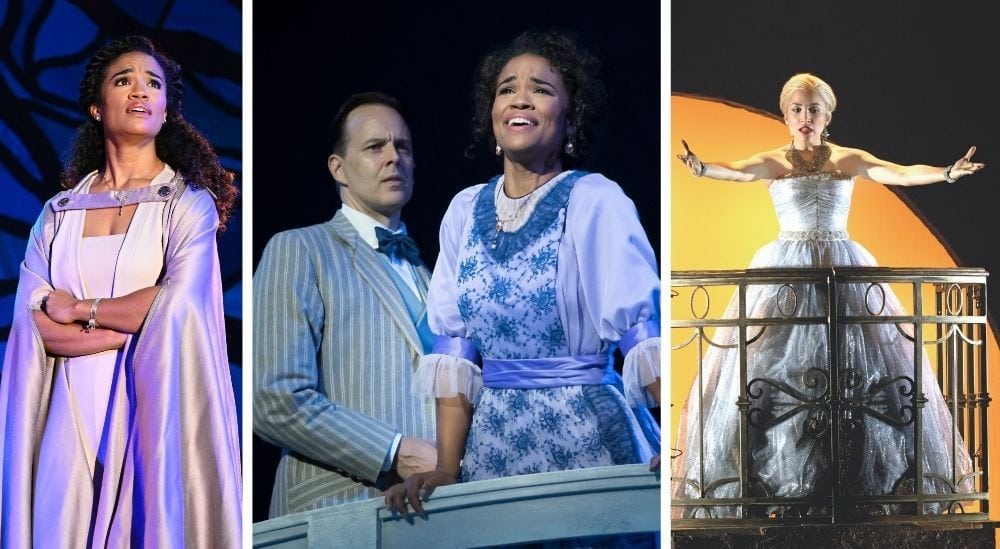
You guys are trendsetters. You have a model that can be exported around the country.
Edwards: Except we do have weather. Our weather is perfect right now, so we have to take advantage of that, combined with the government funding. With that money comes responsibility. The last time this level of federal funding happened in the arts was FDR. We have to rise to the occasion. We want to be an example of what happens when you give real funding to the arts. And what is undeniable is all the people that have been put back to work who are paying taxes, putting the money out into the community.
On the Suncoast Black Arts Collaborative panel I sat in on last night, you mentioned BIPOC participation in your company.
Edwards: BIPOC representation in our theater has been a priority for a long time, with varying degrees of success. When we did Evita, we made a commitment that it be a Latinx cast. A few years ago, we did a bilingual Hamlet in English and Spanish with a Latinx cast. We’re in Florida; for many people, their first language is Spanish and it’s important to us to make every effort to include them in our theater. We had diverse casts for our productions of The Music Man and the Crucible as well as others. We don’t really do anything now without some intentional kind of BIPOC representation.
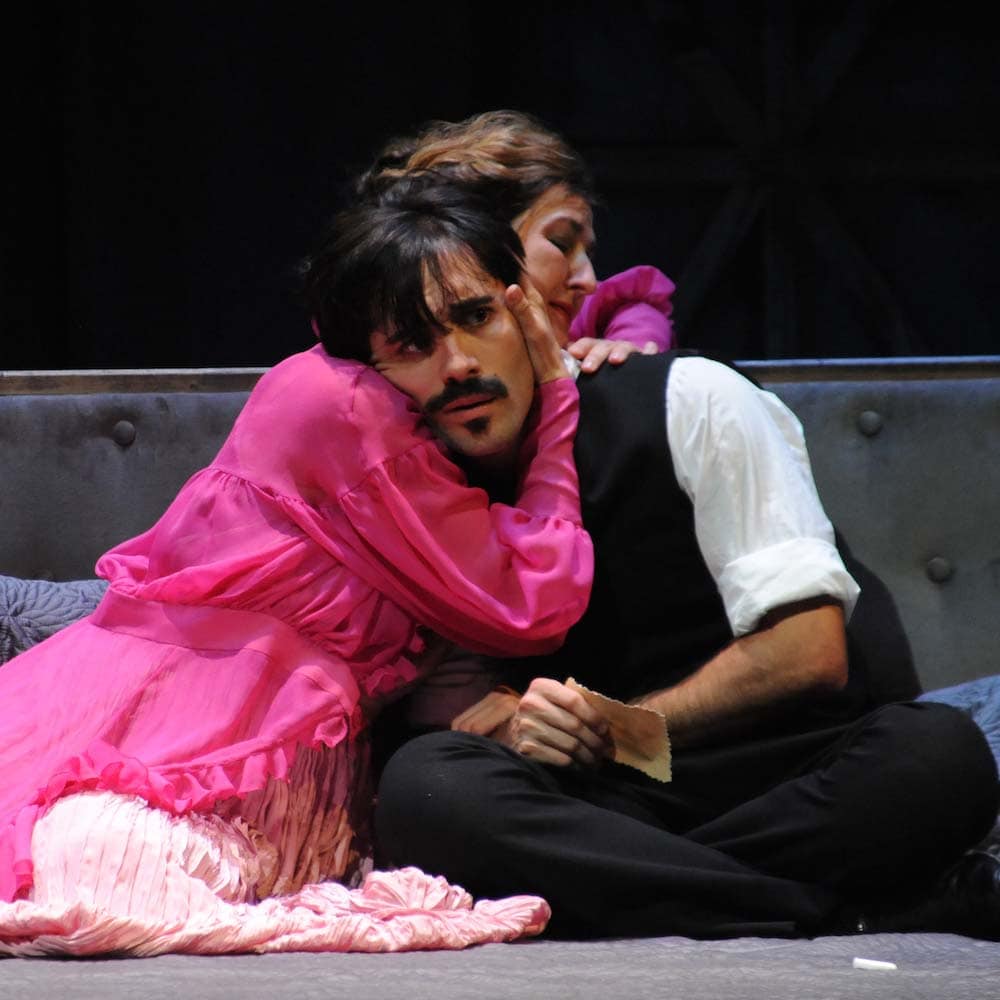
However, in the category of BIPOC stories by BIPOC writers, we have fallen short. We don’t have the record of producing BIPOC writers that theaters in Washington, DC, would have.
Sarasota also has Westcoast Black Theatre [Troupe], with [Founder and Artistic Director] Nate Jacobs, and I’m careful not to do shows he wants to do because all of his shows are centered on the BIPOC experience and we use some of the same people. This is an ecosystem that has to work together.
I’m just so proud we have Westcoast Black Theatre here in Sarasota. It’s a critical part of what makes this community thrive.
We at Asolo Rep have become much more intentional with our IDEA work [Inclusion, Diversity, Equity, and Access] and our work on raising consciousness around these issues for ourselves, our staff, our board, and for our audiences. It’s challenging and exciting work.
Here’s a small but deeply rewarding example. Fannie all radiated out from E. Faye and Cheryl and [Director] Henry [Godinez] and Felton [Offard], the music director.
Originally, Felton played all the instruments himself when they did the abbreviated version of Fannie in Chicago, but he said, I’d love a band and I’d love them to be Black. And as soon as he made the request, we went, Of course. And it was a transformative experience for everyone involved. We are attempting at Asolo Rep to be part of meaningful change by being more open, more informed and aware and inviting all artists to advocate for each other.
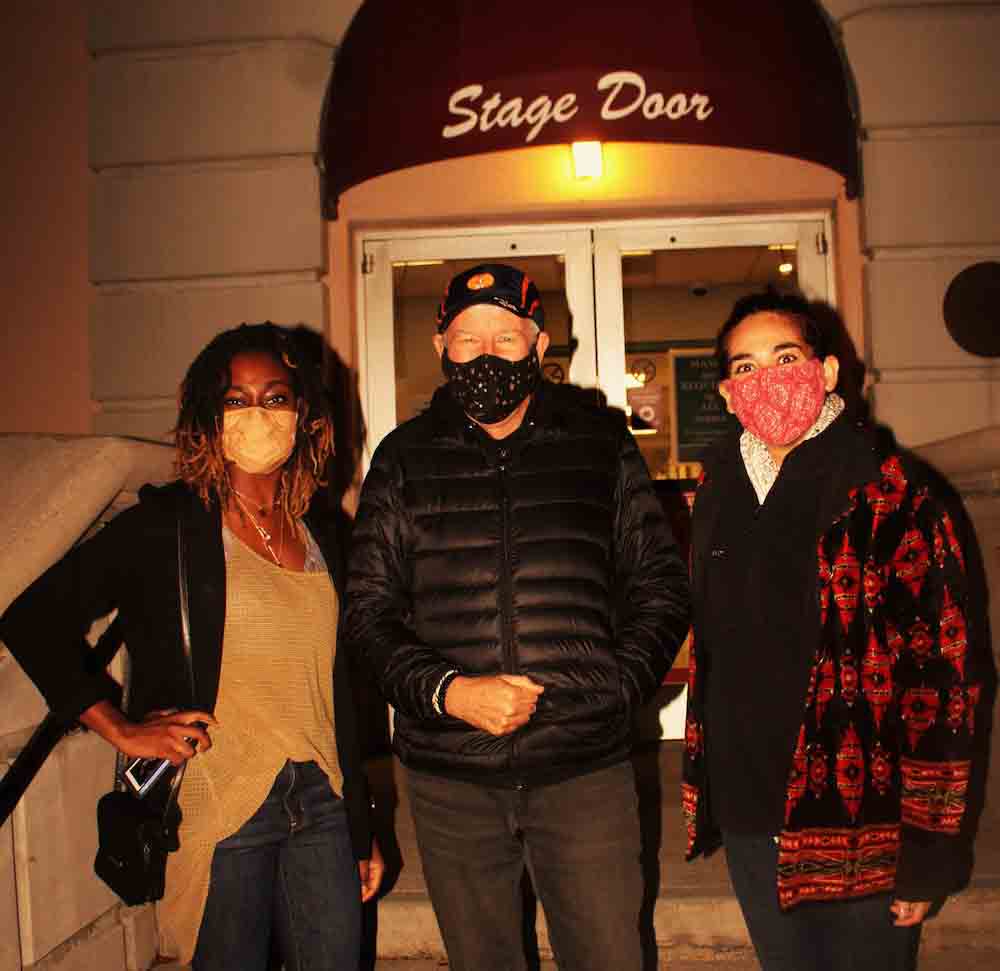
SEE ALSO:
A riveting E. Faye Butler lifts up Black history as Fannie Lou Hamer review of the outdoor Asolo Rep production by Malcolm Lewis Barnes
A challenge to theaters to reopen now—outdoors by Malcolm Lewis Barnes




